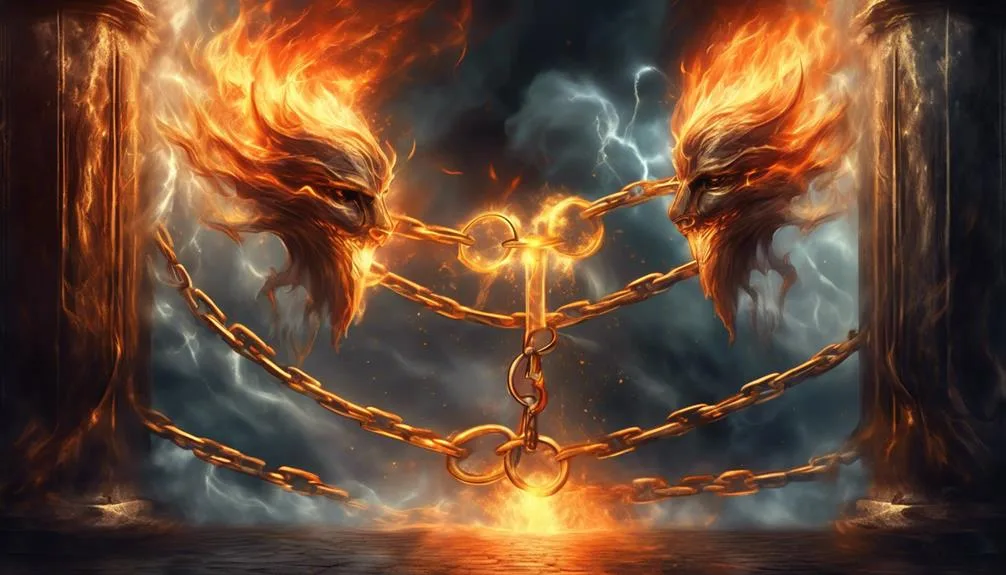In the twin flame journey, finding your perfect match can be overshadowed by challenges, especially for the runner. This role involves dealing with fear, denial, and emotional growth.
Runners face guilt, fear of commitment, confusion, past trauma healing, and separation anxiety. These difficulties are not just barriers but chances for deep personal development.
This article will look at how these challenges shape the runner's path towards eventual reunion and balance.
Key Takeaways
- Recognizing denial and embracing vulnerability are essential steps towards healing in a twin flame relationship.
- Overcoming the fear of commitment and navigating confusion is a common challenge for twin flame runners.
- Healing past traumas and managing separation anxiety are crucial for building a stronger bond with the twin flame.
- Achieving emotional maturity requires self-awareness, self-reflection, and continuous personal growth.
Overcoming Denial

Although confronting denial is challenging, recognizing it as the first step towards healing can empower you to embrace the journey ahead.
It's about acknowledging attraction and embracing vulnerability, which are crucial for your growth and happiness. You might find it tough to admit your feelings and the profound connection you share with your twin flame. However, the sooner you face this truth, the quicker you can move towards reconciliation and fulfillment.
Embracing vulnerability isn't a sign of weakness; it's a testament to your strength and willingness to grow. By accepting the undeniable bond you share, you pave the way for a deeper, more meaningful connection. It's a courageous step towards understanding yourself and your twin flame on a level many never reach.
Dealing With Guilt

After facing the truth about your feelings and the connection with your twin flame, it's common to encounter feelings of guilt that need addressing. This guilt often stems from emotional avoidance, where you've perhaps ignored or pushed away your feelings and your twin flame's efforts to connect deeply.
It's a challenging phase, but there are self forgiveness strategies that can guide you through. Acknowledging your actions and their impact is the first step. It's about understanding why you ran and forgiving yourself for it. Reflect on your fears and insecurities that led to emotional avoidance.
Embrace the discomfort; it's part of healing. Remember, self-forgiveness isn't a one-time event but a journey towards accepting your human flaws and growing from them.
Fear of Commitment

One significant challenge you might face as a twin flame runner is the deep-seated fear of commitment. This apprehension often stems from relationship phobias that can cloud your judgement and make you hesitant to fully dive into the connection with your twin flame.
Here are a few reasons why this fear might hold you back:
- Loss of Personal Identity: You're worried that getting too close might mean losing yourself or sacrificing your independence.
- Past Traumas: Previous relationships may have left scars, making you wary of opening up again.
- Fear of Failure: The idea of not living up to the expectations of a twin flame relationship can be paralyzing.
Understanding these fears is the first step in overcoming them, allowing you to embrace the unique journey that comes with your twin flame connection.

Understanding your fears is crucial, but it's also essential to navigate the confusion that often accompanies a twin flame journey. This path can throw you into an identity crisis, questioning who you're both within and outside the relationship. It's like you're lost in a maze, seeking clarity but finding more questions instead.
Remember, it's okay to feel disoriented. This confusion isn't a sign that you're failing; it's a part of the process of finding your true self. Start by acknowledging your feelings without judgment. Then, take small steps towards understanding your needs and desires. Seeking clarity amid this chaos involves introspection and, sometimes, reaching out for guidance.
You're not alone in this.
Healing Past Traumas

Healing past traumas is a crucial step in your twin flame journey, demanding both courage and patience. As a runner, facing your childhood wounds head-on can be daunting, yet it's pivotal for moving forward. Here's how to make the healing process more bearable:
- Confront childhood wounds: Acknowledge the pain without letting it define you.
- Engage in the forgiveness process: Forgive yourself and others to release the chains of the past.
- Seek support: Don't go at it alone; lean on friends, family, or professionals.
Embarking on this journey helps mend the fragmented parts of your soul, allowing for a healthier connection with your twin flame. Remember, healing isn't a race but a path to profound self-discovery and reconciliation.
Managing Separation Anxiety

Navigating the tumultuous waters of separation anxiety requires facing your fears and learning to find solace within yourself. It's about embracing emotional independence, a journey that isn't always easy but is incredibly rewarding.
You've got to dig deep, acknowledging your insecurities and confronting them head-on. This process fosters a sense of self-reliance that's vital for both your personal growth and the health of your twin flame connection.
Moreover, developing effective communication strategies is key. It's not just about talking; it's about sharing your feelings and fears openly and honestly, without the need for your twin flame to fill every void. By doing so, you're not only managing your separation anxiety but also laying a foundation for a stronger, more resilient bond.
Achieving Emotional Maturity

To achieve emotional maturity, you must first peel back the layers of your emotions, confronting and understanding each one. This journey towards self-awareness growth is integral in navigating the complex relationship dynamics that come with being a twin flame runner.
Here's how:
- Embrace vulnerability: Opening up allows you to understand your fears and desires deeply.
- Practice self-reflection: Regular reflection fosters a better understanding of your actions and their impacts on your relationships.
- Seek constructive feedback: Engage in conversations that challenge your viewpoints and encourage personal development.
Achieving emotional maturity isn't a destination but a continuous process of learning and growing. It's about becoming the best version of yourself for you and your twin flame.
Conclusion
Embarking on the twin flame runner journey presents a myriad of challenges. From acknowledging denial to confronting fears of commitment and overcoming past wounds, each step is pivotal. Navigating separation anxiety and striving for emotional growth are not merely obstacles, but opportunities for profound personal development. Remember, the essence of this journey is about evolving into a more emotionally mature and loving individual. Let these experiences mold you, offering lessons of resilience and self-discovery. Does this journey not reflect the universal quest for inner harmony and connection? Embrace it fully, trusting in the transformative power of these challenges.










